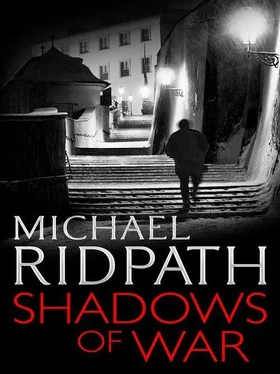Within seconds they had slotted back into the old familiar argument of Hemingway versus Evelyn Waugh. They talked about Paris, about Warren’s nascent novel, about the war and whether the Americans would join it. Conrad resisted the temptation to rag Warren for trying to live the cliché of the American writer in Paris. He had attempted to write his own novel while in Berlin, but given up after two chapters, and his occasional journalism for the magazine Mercury was nothing compared to Warren’s efforts.
They ordered another carafe. The warmth of the bar, Warren’s friendliness and the wine relaxed Conrad, so he felt something of a jolt when Warren reminded him of his reason for being there.
‘OK, Conrad, what’s this semi-official business?’ Warren asked. ‘And what do I have to do with it? I assume I have something to do with it?’
‘You do,’ said Conrad. ‘If you are willing. I’m trying to find out about someone. An American who lives in Paris.’
‘Ah!’ said Warren, his eyes lighting up with interest. ‘And who might that be?’
‘A fellow called Bedaux. Charles Bedaux. A wealthy businessman. You know him?’
‘You bet I do,’ said Warren.
‘Can you tell me about him?’
‘Sure. He was born here, but went over to America before the last war, to Michigan, I think. Invented his own time-and-motion system and made a fortune at it. He has companies all over Europe as well as America, although they hate him there. He fancies himself as something of an explorer: he went on a big expedition in the Yukon a few years ago.’
‘And he’s based in Paris?’
‘He moves around all over the place, but he has a company here. I’m pretty sure he has just signed up with the French Ministry of Armaments, telling them how to jazz up their munitions production.’
‘That’s interesting,’ said Conrad. ‘You do know a lot about him.’
‘Any European journalist would know him. After the wedding.’
‘The wedding?’
‘The damp-squib wedding of the century. Your Duke of Windsor and Wallis Simpson.’
‘I don’t understand.’
‘They got married at Bedaux’s chateau in 1937. Candé, in the Loire. Nobody came. How did you miss that? Where were you?’
‘In Spain getting shot at,’ said Conrad.
‘Oh, yeah,’ said Warren. ‘I guess you had other things to think about. Anyway, Bedaux loaned the couple his chateau, so, as you can imagine, there were a few newspaper profiles on him at the time.’
Conrad nodded. Like everyone else he had read plenty about the duke when he was Prince of Wales, but Conrad had been fighting in Spain when, as King Edward VIII, he had abdicated the throne. Conrad hadn’t given it much consideration, apart from thinking it was careless of his country to lose such a young and energetic monarch in that way.
‘Does Bedaux have any connections with Germany?’ Conrad asked.
‘Sure,’ said Warren. ‘The Nazis grabbed his company in 1934, but he still has good contacts there. He organized the Duke of Windsor’s tour in 1937. Did you know about that?’
Conrad shook his head.
‘I covered it from Berlin. It was a big deal in Germany; they loved him. The duke and duchess visited factories and housing projects. Your compatriots weren’t so excited, though. There was a half-assed Nazi salute, playing with Göring’s train set, shaking hands with Hitler, that kind of thing.’
Conrad winced. ‘Ouch. Was Bedaux there?’
‘No. But he fixed it all up. Then he fixed a tour for them to America, which fell through when the American unions kicked up a fuss. They despise his time-and-motion system there. Bedaux had a nervous breakdown, I believe, and he’s laid low since then.’
‘Didn’t I read that the duke is in France at the moment?’ Conrad asked.
‘Yes he is. He and Wally lived here in Paris after the wedding, but they were down in Antibes when war broke out, and skedaddled back to Britain. The British government sent him over here a month ago. He’s big buddies with the US Ambassador, William Bullitt, and a lot of the other rich Americans in Paris. In fact he’s also buddies with your sister-in-law. At least I assume she’s your sister-in-law.’
‘Isobel Haldeman?’ Isobel was Veronica’s younger sister, who had married Marshall Haldeman, an American insurance executive who had moved to Paris a few years before. Conrad hadn’t seen her since he had left for Spain.
‘That’s right.’
‘Would she know Bedaux as well?’
‘Sure too. All those right-bank Americans know each other. Bedaux’s wife is much more American than him. She’s an heiress from Kalamazoo. Fern is her name.’
‘I can’t quite accept that Kalamazoo is a real place,’ said Conrad.
‘Oh, it is,’ said Warren. ‘And I wouldn’t kid Fern about her home town if I were you. Scary lady, Fern Bedaux.’
‘Are the Bedauxs and the Windsors still friends?’
‘Don’t know. Mrs Haldeman might have a better idea. You should speak to her. Someone else you might want to talk to is Fruity Metcalfe.’
‘Fruity?’
‘Hey, don’t blame me for your dumb British nicknames. Although he’s Irish, I think. He was the duke’s best man at his wedding and is acting as his royal sidekick now — what do you call it? Aide-de-camp, something like that. Swell guy. Partial to a drink or two. He’s staying at the Ritz, and likes to prop up the bar there after a hard day’s duking.’
Paris, 14 November
Conrad slept on Warren’s sofa. He had a small apartment above Shakespeare and Co., an English language bookshop in the rue de l’Odéon. It was run by an American woman and, according to Warren, it was the centre of American literary life in Paris. Warren loved it.
Warren also had to work, so Conrad left his apartment and, armed with Isobel Haldeman’s address, which Warren had dug out for him, found a café in which to while away a couple of hours until he could decently turn up at her house. The sun shone weakly on the quiet street, the coffee was good, and for a moment Conrad was able just to enjoy the fact he was sitting in a café in Paris instead of chasing his men around the mud of Salisbury Plain. An old soldier with a fine white moustache and one leg gave Conrad a gruff nod. He sported the red ribbon of the Légion d’honneur on his lapel, and alternated puffs at a pipe with sips of an early morning ballon de vin rouge. He was a reminder of what war could do, what it would do again once it eventually got going.
Which might be as soon as the next day, if Theo was correct about the date of the offensive. Unless Theo was also correct about the generals dumping Hitler. Conrad understood the Prussian military ethos, how difficult it was for them to move against their commander-in-chief and to break the oath that Hitler had made them all take swearing allegiance to him personally. Conrad prayed that they would have the courage to do it.
Because if they didn’t, hell would be let loose on the Low Countries and northern France. Again.
That would be a disaster. Conrad was convinced that the Munich peace talks were a colossal error, that the appeasers like his father were wrong, and that the only thing to do was to stand up to Hitler. That was, after all, why he had joined the army. But things were not that simple. Perhaps he should have helped his father negotiate with Theo, if it led to a genuine peace with honour. He knew his father’s motives were noble: if your aim was to preserve peace, why start a war? Conrad’s argument had always been that you had to show your willingness to stand up to Hitler if you wanted to stop him. If the generals did get rid of him, then Conrad would have been proved right.
But what if they didn’t? Conrad wouldn’t have stopped Hitler after all. And hundreds of thousands, possibly millions of people would die, soldiers and civilians. Lord Oakford would at least be able to say that he did everything he could have done to prevent the massacre.
Читать дальше












